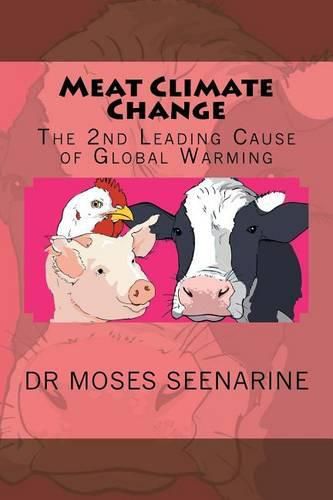Readings Newsletter
Become a Readings Member to make your shopping experience even easier.
Sign in or sign up for free!
You’re not far away from qualifying for FREE standard shipping within Australia
You’ve qualified for FREE standard shipping within Australia
The cart is loading…






An argument for combating climate change through modifying agricultural practices and eating habits. Seenarine (Education and Empowerment Among Dalit (Untouchable) Women in India, 2004) argues for a meatless diet as a key tactic for reducing greenhouse gases, minimizing weather changes, and improving human health. The book provides a dense overview of current climate science and policy, and reviews the impact of rising temperatures on not only the physical environment, but also economics, international relations, and gender politics. The reduction or elimination of meat consumption (referred to here as carnism ) is held up as the solution to a thoroughly researched, footnoted argument. Seenarine draws on a variety of research to present a solid case for recognizing meat production as a significant factor in greenhouse-gas emissions. - Kirkus ReviewsMeat Climate Change is an essential guidebook on the intersection of climate and diet, and related environmental, social and psychological issues. The book covers a wide range of disciplines, and reviews hundreds of research studies. The good news is that plant-based diets can stop climate chaos! This must-read, essential guidebook show how, and in addition there are chapters on the critical 2015 Paris Climate Agreement, health under climate change, diet and health, antibiotic resistance, food-borne illness, and zootic diseases like bird flu. The book examines intersectional issues like how climate and diet will impact agriculture, the poor, water, forests, soil, oceans, biodiversity and disease.The book provides an excellent background on climate literacy, and great insights into climate politics. Importantly, it explores near term climate change scenarios to the year 2100, and necessary personal, social and policy changes for climate mitigation.
$9.00 standard shipping within Australia
FREE standard shipping within Australia for orders over $100.00
Express & International shipping calculated at checkout
An argument for combating climate change through modifying agricultural practices and eating habits. Seenarine (Education and Empowerment Among Dalit (Untouchable) Women in India, 2004) argues for a meatless diet as a key tactic for reducing greenhouse gases, minimizing weather changes, and improving human health. The book provides a dense overview of current climate science and policy, and reviews the impact of rising temperatures on not only the physical environment, but also economics, international relations, and gender politics. The reduction or elimination of meat consumption (referred to here as carnism ) is held up as the solution to a thoroughly researched, footnoted argument. Seenarine draws on a variety of research to present a solid case for recognizing meat production as a significant factor in greenhouse-gas emissions. - Kirkus ReviewsMeat Climate Change is an essential guidebook on the intersection of climate and diet, and related environmental, social and psychological issues. The book covers a wide range of disciplines, and reviews hundreds of research studies. The good news is that plant-based diets can stop climate chaos! This must-read, essential guidebook show how, and in addition there are chapters on the critical 2015 Paris Climate Agreement, health under climate change, diet and health, antibiotic resistance, food-borne illness, and zootic diseases like bird flu. The book examines intersectional issues like how climate and diet will impact agriculture, the poor, water, forests, soil, oceans, biodiversity and disease.The book provides an excellent background on climate literacy, and great insights into climate politics. Importantly, it explores near term climate change scenarios to the year 2100, and necessary personal, social and policy changes for climate mitigation.